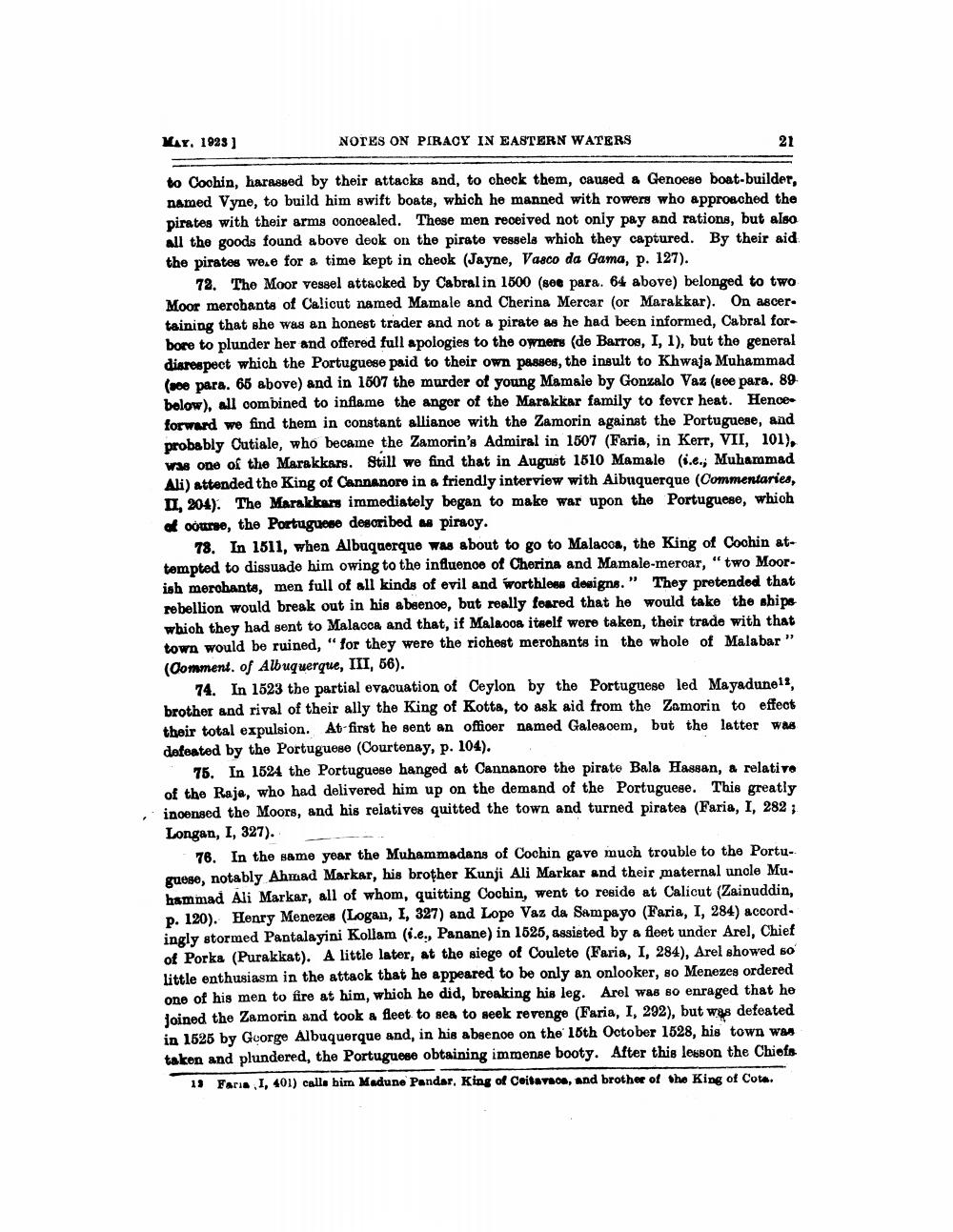________________
NOTES ON PIRACY IN EASTERN WATERS
21
MAY. 1923]
to Cochin, harassed by their attacks and, to check them, caused a Genoese boat-builder, named Vyne, to build him swift boats, which he manned with rowers who approached the pirates with their arms concealed. These men received not only pay and rations, but also all the goods found above deok on the pirate vessels which they captured. By their aid. the pirates were for a time kept in check (Jayne, Vasco da Gama, p. 127).
72. The Moor vessel attacked by Cabral in 1500 (see para. 64 above) belonged to two Moor merchants of Calicut named Mamale and Cherina Mercar (or Marakkar). On ascer taining that she was an honest trader and not a pirate as he had been informed, Cabral forbore to plunder her and offered full apologies to the owners (de Barros, I, 1), but the general disrespect which the Portuguese paid to their own passes, the insult to Khwaja Muhammad (see para. 65 above) and in 1507 the murder of young Mamale by Gonzalo Vaz (see para. 89. below), all combined to inflame the anger of the Marakkar family to fever heat. Hence forward we find them in constant alliance with the Zamorin against the Portuguese, and probably Cutiale, who became the Zamorin's Admiral in 1507 (Faria, in Kerr, VII, 101), was one of the Marakkars. Still we find that in August 1510 Mamale (i.e.; Muhammad Ali) attended the King of Cannanore in a friendly interview with Aibuquerque (Commentaries, II, 204). The Marakkars immediately began to make war upon the Portuguese, which of course, the Portuguese described as piracy.
78. In 1511, when Albuquerque was about to go to Malacca, the King of Cochin attempted to dissuade him owing to the influence of Cherina and Mamale-mercar, "two Moorish merchants, men full of all kinds of evil and worthless designs." They pretended that rebellion would break out in his absence, but really feared that he would take the ships which they had sent to Malacca and that, if Malacca itself were taken, their trade with that town would be ruined, "for they were the richest merchants in the whole of Malabar " (Comment. of Albuquerque, III, 56).
74. In 1523 the partial evacuation of Ceylon by the Portuguese led Mayadune 12, brother and rival of their ally the King of Kotta, to ask aid from the Zamorin to effect their total expulsion. At first he sent an officer named Galeaoem, but the latter was defeated by the Portuguese (Courtenay, p. 104).
75. In 1524 the Portuguese hanged at Cannanore the pirate Bala Hassan, a relative of the Raja, who had delivered him up on the demand of the Portuguese. This greatly incensed the Moors, and his relatives quitted the town and turned pirates (Faria, I, 282; Longan, I, 327).
76. In the same year the Muhammadans of Cochin gave much trouble to the Portuguese, notably Ahmad Markar, his brother Kunji Ali Markar and their maternal uncle Muhammad Ali Markar, all of whom, quitting Cochin, went to reside at Calicut (Zainuddin, p. 120). Henry Menezes (Logan, I, 327) and Lope Vaz da Sampayo (Faria, I, 284) accordingly stormed Pantalayini Kollam (i.e., Panane) in 1525, assieted by a fleet under Arel, Chief of Porka (Purakkat). A little later, at the siege of Coulete (Faria, I, 284), Arel showed so little enthusiasm in the attack that he appeared to be only an onlooker, so Menezes ordered one of his men to fire at him, which he did, breaking his leg. Arel was so enraged that he defeated Joined the Zamorin and took a fleet to sea to seek revenge (Faria, I, 292), but was in 1525 by George Albuquerque and, in his absence on the 15th October 1528, his town was taken and plundered, the Portuguese obtaining immense booty. After this lesson the Chiefs
13 Faria I, 401) calls him Madune Pandar, King of Ceitavaca, and brother of the King of Cota.




